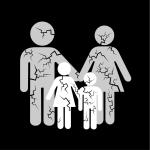Read Time: 8 minutes
There is a group in our culture that has become increasingly marginalized, dismissed and demonized by Evangelicals over the last several years. That group is the community of angry people, especially angry Christians. Angry people have been consistently mistreated, misrepresented and maligned by both Church and society. They are often labelled as “extremist,” “abusive,” “mean” and, worst of all, “unloving” by those considered to be socially acceptable. Conservative Christians especially, but progressives as well, are notorious for pressuring angry Christians to change their ways, or else be excluded from their fellowship.
It is understandable, perhaps, that those who struggle with or identify as angry would be so mistreated in today’s post-Christian culture. But that the Church, the so-called “Body of Christ” on earth, has participated in marginalizing tactics against people of anger is truly shameful. It is a Christian deviancy that must once and for all be corrected. It is not a genuine display of God’s love to treat the angry any different than the rest of us.
And so it is time for angry people to finally lift up their voices in protest. It is time for those who were born aggressive, to stand up and be counted. In this post, I call for the Church to finally come clean about its historical treatment of the AVAW+ community (Angry, Violent, Aggressive, and Wrathful). We as the Body of Christ must correct both the long history of faulty biblical exegesis, and the oppressive, matriarchal theology that has for too long shut out those whose God-given orientation is simply different from what is asserted to be “the norm.”
The Bible on Anger
The scriptures are clear on anger. In Ephesians 4:26, the Apostle Paul tells the members of the Ephesian church to “be angry.” Anger obviously cannot be a sin, if the chief evangelist of the Gospel of Jesus Christ, the author of half of the books of the New Testament, can command his audience to be angry. In addition, God throughout the Old Testament is always getting angry. God’s wrath “burns” (Exodus 22:24) constantly in the Hebrew Bible, and Jesus also often gets angry in the New Testament (Mk 3:5; Mk 11:15; Matt 21:12; Jn 2:15-17). He even says he has come to “bring a sword” to the world, and not peace (Matt 10:34)!
Moreover, in those passages that seem to warn about anger, or anger-induced action, it is fairly obvious that these injunctions against anger or aggressive behavior must be understood within their historical context. Given what we now know about how power dynamics work within societies, something ancient cultures were totally ignorant about, we can see that when Paul speaks out against anger (2 Cor 12:20; Gal 5:20), what he really has in mind is only the kind of anger that people in positions of social dominance might display against those in positions of social weakness or marginalization.
Thus, it would be wrong for the master to be angry with his slave, given the slave’s status. However, clearly it cannot be wrong for the servant to be angry at his (or her, or they’s) master. Most anger relationships in the ancient world were just like this: the anger of a superior toward his or her (or they’s) social inferior. Because masters were socially privileged, their anger was immoral. As socially underprivileged, however, slaves, women, and other minorities could not really be angry, at least not in a sinful way. Only people in power could be angry and sinful, and that was because of their privilege.
Finally, if two people possessing the same social status, e.g., two slaves or two women, were angry at each other, then this too could not be sinful or worthy of condemnation. Again, knowing what we now know, any expression of anger among members of a socially oppressed group is always a demonstration of “false consciousness.” False consciousness is an expression of the hegemonic class’ own hatred which, tragically, is adopted by some within the marginalized community. Any expression of anger by those oppressed is just a form of false consciousness, and, therefore, is the fault of the oppressor class.
Jesus’ Radical Mission
Fortunately, it is these social inequalities that Jesus came to radically overturn. In fact, it was specifically for this purpose that Jesus came: to empower us to deconstruct social roles and norms so that justice and equity might finally prevail in the world. It is this communal justice that is meant to sustain us until we die. Unfortunately, we still have no answer to death, but, man willing, technological advancement might yet solve that pesky issue (although most of us will be long since dead and unable to avail ourselves of technological immortality).
Thus, anger today is only wrong if and where those inequalities in society still exist. It is only sinful when expressed by those in positions of power. This new understanding, this fantastic new insight into human nature, allows us to better understand what Jesus must have really meant in the Sermon on the Mount. In Matthew 5:21-26 we can now see that Jesus is speaking mainly about power dynamics. Is it wrong to murder? Sure, but only if you are in a position of power already. Is it wrong to be angry with your brother? Yes, but again, only if you already have the upper hand and possess social and economic privilege.
Scholar and luminary Robin DiAngelo has pointed this out with great acumen in our own times. For example, only white people who get angry sin, because it is only white people in America who have privilege. To neglect this truth, and other related truths, would be to reduce the radical nature of Jesus’ mission on earth. It would be to utterly mischaracterize the Gospel. If we deny this new knowledge, then we empty Christianity of its revolutionary content, effectively taming the message of Jesus. But this is the real Jesus’ revolution: the revolution of radical inclusion!

The Naturalness of Anger
Anger, like many desires and dispositions, is natural to us. Just like our sexual drives, feelings and orientations, anger is also entirely involuntary. Anyone who knows what it is like to be angry, and to have outbursts of anger, knows that anger just comes over one. Anger is not unlike a lustful feeling toward a member of the opposite, or same, sex who we find attractive. Anger is the most natural of instincts. As one Christian apologist put it “Anger is like a sneeze, it has to burst out.” In fact, it is even more natural than our sexual instincts, which only develop upon reaching puberty. Orientations toward anger arise long before boys or girls reach their formative sexual years. They are with us from the very beginning, even though we can never answer the “nature, nurture” question completely.
Since angry people are “born this way,” churches must do a better job of being welcoming and affirming of our angry brothers and sisters, and non-binaries, who cannot undo or get rid of their aggression. Many have prayed desperately for their anger to “go away.” “Pray the anger away,” it has often been said. But, we all know that the reality is different. Prayers, or pseudo-therapies that try to convert anger or aggression into patience or peaceableness are themselves abusive. They not only deny the identity of the angry person, but make them feel guilty and ashamed of that identity. This form of spiritual abuse only leads to more psychological and mental health issues, and a further marginalization of those society deems to be “other.” It also only leads to more anger, since the angry person must now be angry about their inability to overcome their most natural desires.
Churches must affirm and welcome what is natural to us. This cannot be limited to just our sexual desires or our desire for fame, fortune and empowerment. While we are doing a much better job in those areas of discipleship than in prior generations, we must still do a better job of letting angry people know that they are loved, accepted, and validated. If not, we will only see more of the same: more exclusion, more marginalization and more feelings of isolation and loneliness. We cannot continue to preach a Gospel of peace and love, if we continue to condemn those who are angry and desire to express that anger. Such inconsistencies only expose our hypocrisy as Christians.
I beseech Evangelicals, especially those conservative ones, to accept this modest proposal: stop being so condemning toward the angry in our churches and our nation. After all, they too are made in the image and likeness of our Creator, whose name, after all, is “man of war” (Exodus 15:3).













